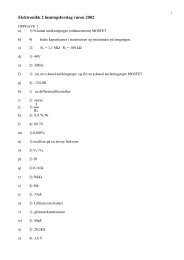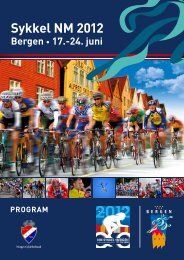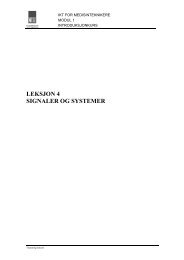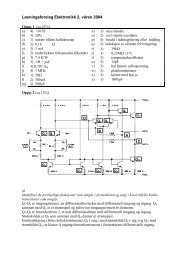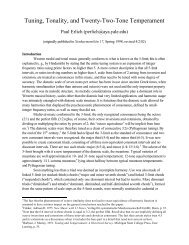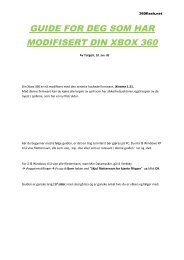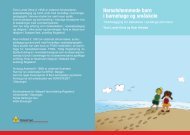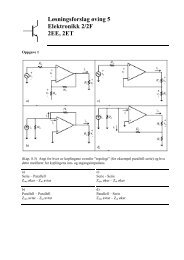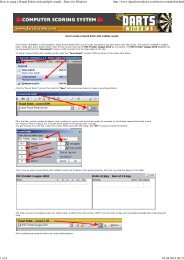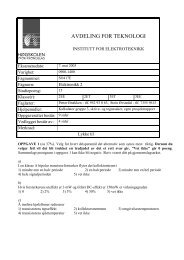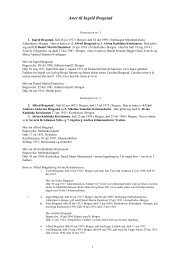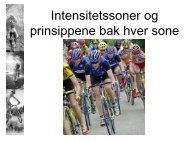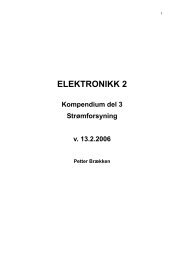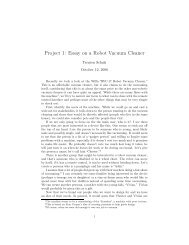The Online World resources handbook
The Online World resources handbook
The Online World resources handbook
You also want an ePaper? Increase the reach of your titles
YUMPU automatically turns print PDFs into web optimized ePapers that Google loves.
Cheaper and better communication http://home.eunet.no/~presno/bok/13.html<br />
Quick capture, read offline.<br />
Netscape uses a special cache directory for temporary storage of files. It is set by<br />
clicking on Options, Preferences, Cache and Network. I use a 600 KB Memory Cache,<br />
and a 1500 KB Disk cache.<br />
Whatever files are received from the Internet are stored in this cache. <strong>The</strong>y will<br />
probably remain there until specifically removed (deleted), even after leaving<br />
Windows. <strong>The</strong>refore, unless you use the "Clear Disk Cache now" option on the Setup<br />
menu regularly, you can read them offline.<br />
Everything is there. This means that you can go online, get the pages, log out, and<br />
read the pages as local files off your cache directory.<br />
Reducing the cost of using mailing lists<br />
<strong>The</strong> problem of using mailing lists is that all discussion items come to you in individual<br />
messages. Each message comes with its own mailer header, and this information is<br />
generally completely useless. (Read "Returned mail" in Chapter 7 for details.)<br />
Newer versions of the LISTSERV software provide settings that solve this problem,<br />
notably the DIGEST and the INDEX options. You can set these options by email to the<br />
server, or (easier) using the mailing list's web interface.<br />
<strong>The</strong> DIGEST option<br />
makes all daily messages come to you in one, single message. This is a big help on<br />
systems with limits on the number of messages that can be received. It will help manage<br />
the flow of message. Also, it makes the messages easier to retrieve, print, and deliver as<br />
individual messages.<br />
<strong>The</strong> INDEX option<br />
gives you a daily list of messages as in this abridged example from Net Happenings:<br />
Date: Fri, 4 Feb 2000 10:15:25 0600<br />
Reply To: NET HAPPENINGS Search request@HYPATIA.CS.WISC.EDU<br />
Sender: Net Happenings <br />
From: Automatic digest processor <br />
Subject: NET HAPPENINGS Index 3 Feb 2000 to 4 Feb 2000 Special issue<br />
(#2000 61)<br />
Index Date Size Poster and subject<br />
018502 02/04 55 From: Gleason Sackmann <br />
Subject: K12> [ClassWeb] Technology, Learning & Children<br />
Symposia call for presenters<br />
018503 02/04 20 From: Gleason Sackmann <br />
Subject: UPDATED> TURTLE TRACKS Native American Newsletter<br />
for Children<br />
018504 02/04 20 From: Gleason Sackmann <br />
Subject: K12> <strong>The</strong> School Teacher Mailing List/ Web Site<br />
018505 02/04 55 From: Gleason Sackmann <br />
Subject: MISC> [DUC] HUMOR AND WISDOM: How to Deal With All<br />
of the Complaints That theVet Pet List is TOO USEFUL<br />
018506 02/04 54 From: Gleason Sackmann <br />
Subject: K12> S.O.S. Help for Busy Teachers 2/4/00<br />
<strong>The</strong> sizes shown are the number of lines in the messages, not counting mail<br />
headers.<br />
To order the messages you are interested in, simply reply to this message and<br />
include the original text, just as when you are replying to a normal message<br />
and want to quote what your correspondent said. Before sending the message,<br />
delete the lines corresponding to the items you are not interested in, and make<br />
3 of 7 23.11.2009 15:48



